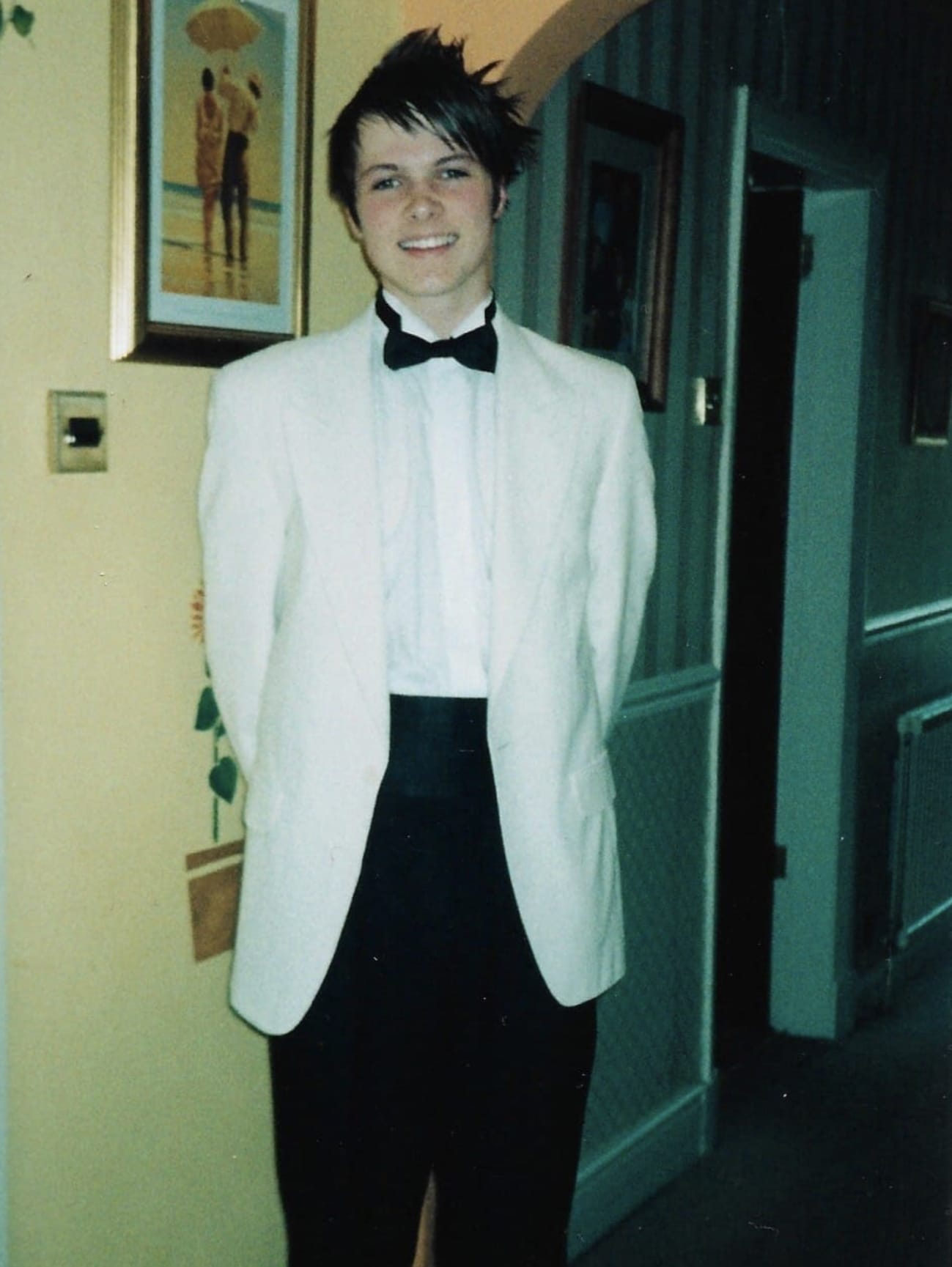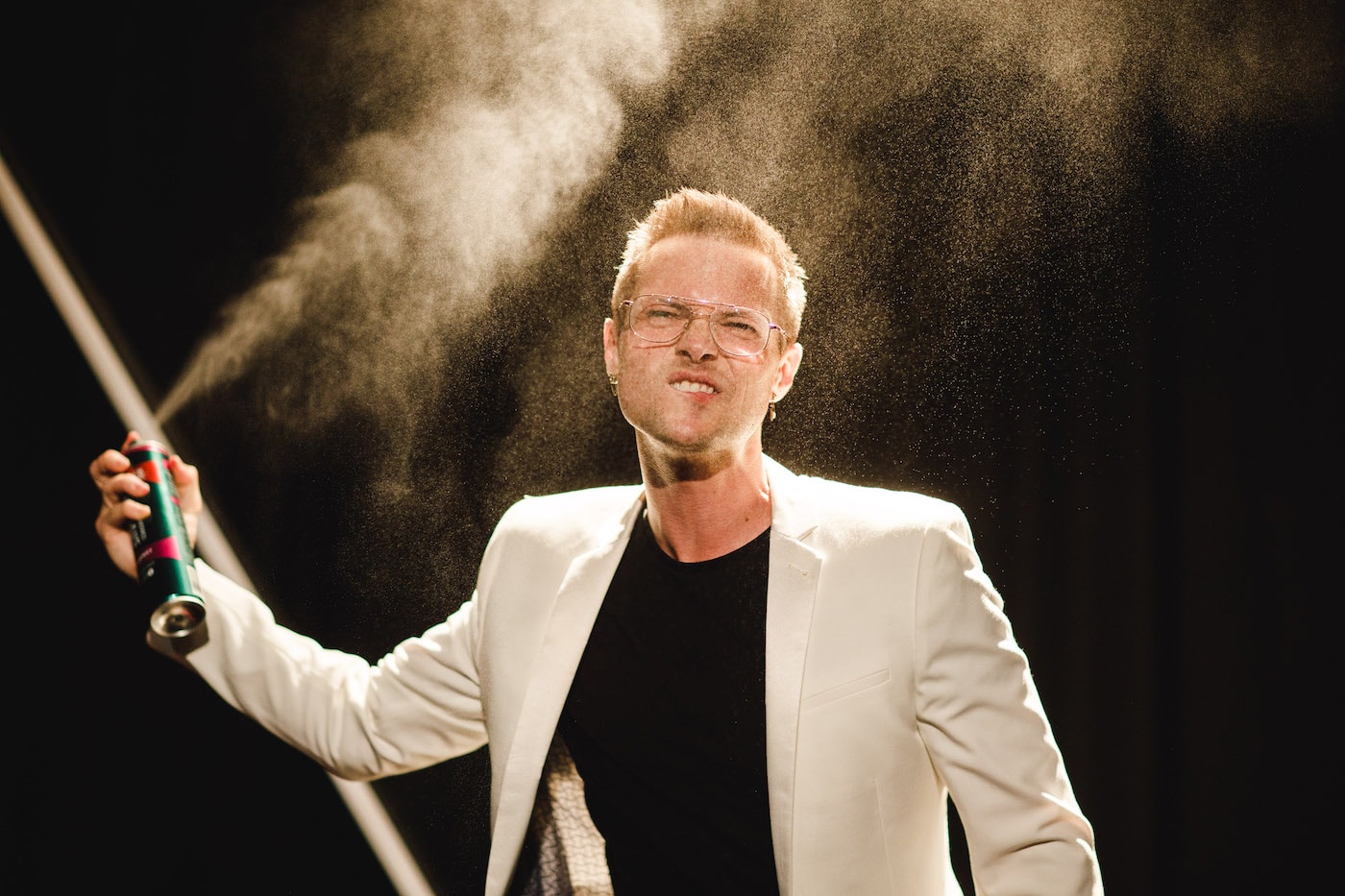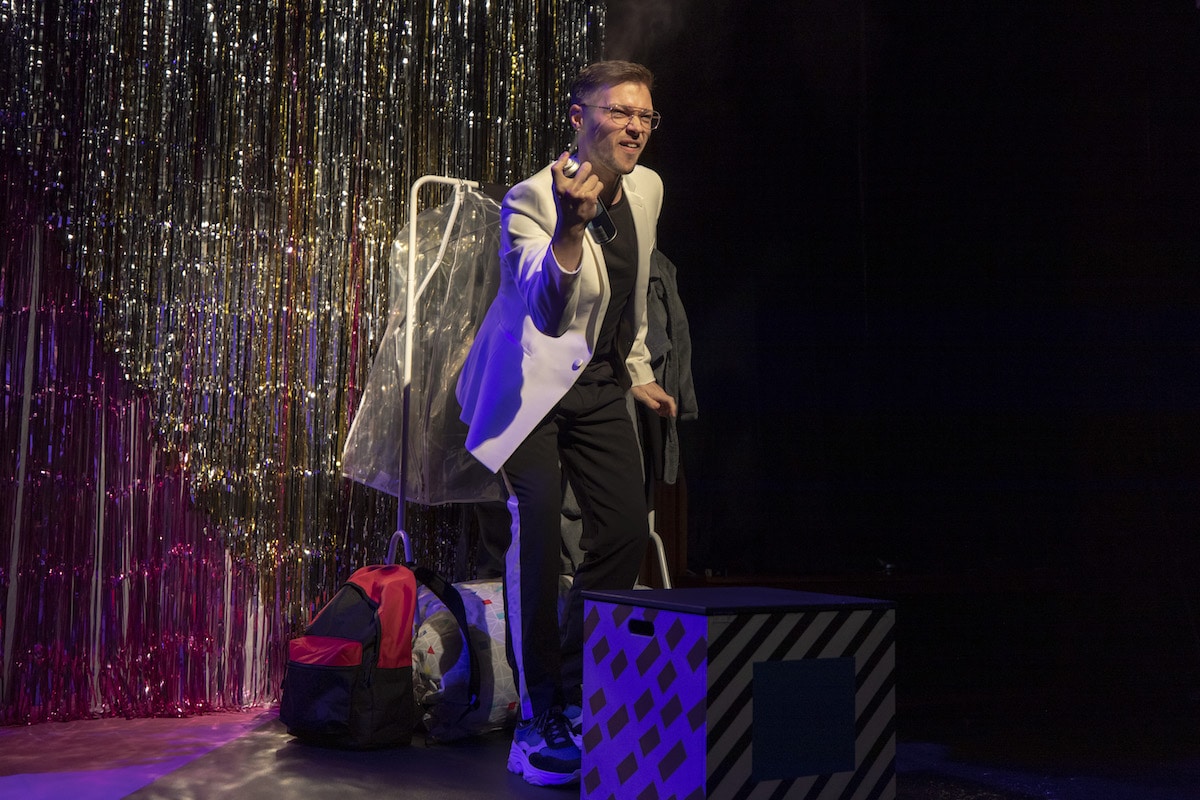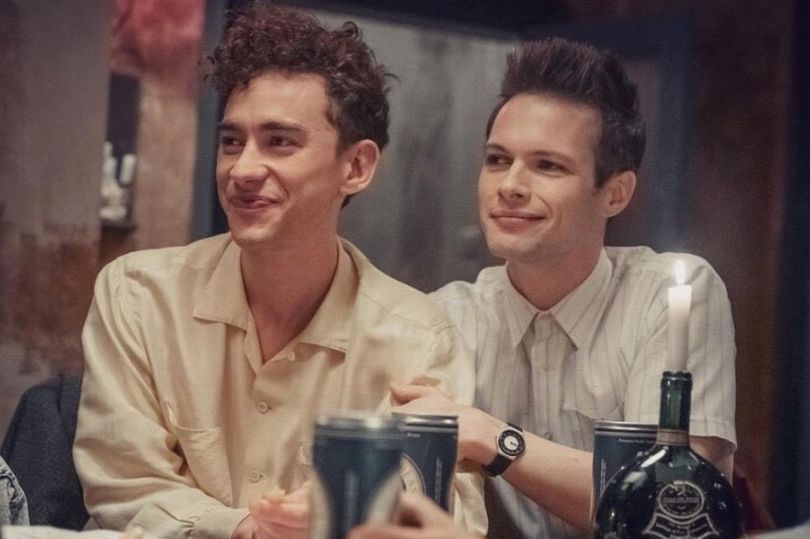It’s a Sin star Nathaniel Hall on contracting HIV, aged 16, and how to fight shame and stigma
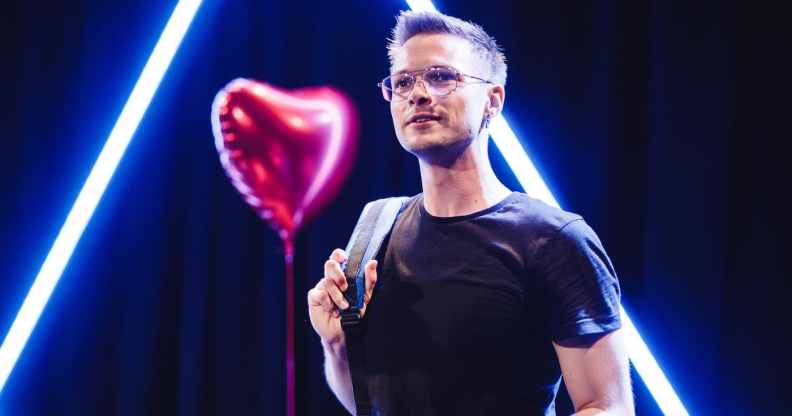
Nathaniel Hall in First Time. (Andrew Perry)
Nathaniel Hall was two weeks shy of his 17th birthday when he was diagnosed with HIV.
That moment turned his life upside down, and it sent him on a long journey through stigma, shame and secrecy. It would be 15 years before he would tell his family about his diagnosis.
Since then, Nathaniel Hall has written his own one-man play about his experience of HIV. First Time debuted in 2018 to critical acclaim. Since then, he has starred in It’s a Sin, the groundbreaking Channel 4 series that explored the early years of the AIDS epidemic from the perspective of London’s LGBT+ community.
Now, First Time is making a comeback. Nathaniel is about to take his one-man show out on the road, bringing his heartbreaking and empowering story to the masses once more.
Getting to this point has been a long, often arduous journey. Nathaniel created First Time to break through the harm caused by years of silence and stigma – but he also wrote his experience into being because he felt that there were no other stories like his being told.
“I didn’t see it represented,” Nathaniel tells PinkNews. “There are so many great films and musicals and plays about HIV, and they’re fantastic, but they’re all about illness and death and dying, and they’re also about the amazing activism that went alongside that fight. With First Time, I said: ‘What’s it like to live with HIV day to day?’ Because we talk about HIV in soundbites.
“Sometimes, as an activist, it’s like: ‘U=U, take PrEP, and if you get diagnosed it’ll all be fine, it’s a pill a day,’ but actually that does a disservice, because life with HIV isn’t a walk in the park.
“I’d much rather not have HIV than have it, so I was like, how do we tell that side of the story? What’s the psychological impact of living with HIV? And that’s different from person to person, but universally we know that people living with HIV tend to have a greater risk of developing mental health challenges throughout their lives and generally we need that little bit of extra support as most people often do in parts of their lives. I wanted to unpick all that and show people the trauma of that diagnosis.”
Nathaniel Hall’s view of HIV was coloured by ‘outdated’ and harmful sex education
The story Nathaniel tells in First Time is complex and often painful. He was a self-described “Section 28 kid” – growing up under the shadow of Thatcher’s homophobic law meant he was starved of positive LGBT+ representation. He finished school the same year that much maligned law was finally repealed.
Nathaniel recalls being shown a video about HIV in a sex education class when he was about 13 or 14 years old. It was a traumatising, unsettling moment that shaped his early attitudes to sexuality.
“[The video] was out of date – even then it was already out of date,” Nathaniel says. “It was about a gay man who had been diagnosed with HIV and he was dying. It was very heavy – really not appropriate to show young people. And I remember sitting at the front of the class knowing that I was potentially gay but not wanting to show it and feeling those 27 pairs of eyes burning the back of my neck going like: ‘That’s who you are. That’s your fate.’
“A pivotal moment in any young queer person’s life is when you first know there are other people like you out there. That was the first time I understood what being gay was, probably aged 13 or 14. We didn’t have positive gay representation in music and film and television, it just wasn’t the same back then.”
When he was 16, Nathaniel started to explore his sexuality. He started “messing around” with the deputy head boy, and he was becoming increasingly aware that he was gay. Shortly afterwards, everything changed following a chance encounter.
“I met this guy on a bench in Stockport. He’s older than me and he’s everything I know I want to be – he’s fashionable and witty and camp and handsome, and it’s intoxicating and I want to be part of that world, so I jumped in with two feet,” Nathaniel recalls. “It was a little bit of a two fingers up to the white, middle class, straight upbringing that I’d had – it was my rebellion. And that’s where I contracted HIV, from that first experience, from that first relationship, and really I think that’s one of the reasons why I shut down so much about it.”
And that’s really why I think I shut down and just decided not to tell anyone, to just pretend it hadn’t happened.
It was around that time that Nathaniel sat down with his mum and told her that he was gay and that he was seeing an older guy. He was told to call it off, but it was too late – Nathaniel had already contracted HIV.
“It was really, really traumatic to hear those words at 16 – and the diagnosis is still not something I would ever wish on anyone today,” Nathaniel says. “In terms of what information I was given, I was told it was life-limiting. I was told about medications that would be potentially difficult to stomach and manage that I needed to be prepared for. There were issues with discrimination in the workplace, getting travel insurance was not a thing, getting life insurance was not a thing. There were just so many more barriers, and to be told that at that age was huge. And that’s really why I think I shut down and just decided not to tell anyone, to just pretend it hadn’t happened, and just try to get on with my life and ignore it as much as I could.”
He thought he was living his ‘best queer life’ – but silence and secrecy were taking their toll
Nathaniel tried to ignore his HIV diagnosis and vowed to live his life to its fullest – but as time went by, he realised that the shame that came with keeping his status a secret was holding him back.
“15 years is a long time and a lot of life happened in that time,” he says. “I got a degree, I was in relationships, I did stupid things, I travelled the world. I was ticking all the boxes I wanted to tick but there was always this weight behind me. When you haven’t done the work on past trauma, you don’t notice how it’s impacting you and it’s only when you stop and look back and you go, ‘Oh my God.’”
Over time, Nathaniel found himself falling into what he later realised were “essentially abusive relationships”. Alcohol and drugs also crept into his life in a new way, offering a coping mechanism when life was at its most oppressive.
“I thought I was just living my best queer life, as you do, but it all came to a head after a particularly toxic relationship I was in for about five years,” he says. “I caught myself two days after a house party, still awake, in the mirror, and I looked a complete state. I just didn’t recognise myself anymore, and I realised I had completely lost the path I was on. I’d lost track of who I was as well because of that emotionally abusive relationship – I had started to believe that I wasn’t a good person, that I didn’t deserve nice things, that I didn’t have anything to offer the world, whereas when I was younger I had that hope and ambition.”
Even if it hadn’t gone well I still think I’d be in a better place today because once you start to live authentically, that’s where the magic happens.
Nathaniel now recognises that what he experienced at that time was a breakdown – years of coping with internalised shame had led him down a dark, destructive path.
“A mental breakdown doesn’t happen in one moment,” Nathaniel explains. “It’s like a car crash in slow motion. You feel your life slowly falling apart. My career had stagnated and I was self-sabotaging all the time. I was a nervous wreck in auditions and I was suffering from what I now know was post-traumatic stress disorder, anxiety disorders, the whole kit and caboodle, and so it was that point that I just went, it’s sink or swim here.
“I knew I was in quite a dark place and that that could have really spiralled out of control, and the self-destructive route was there. The ‘f**k it’ button was being pushed a lot and it was getting to crunch point, and that’s when I went, ‘No, I don’t want this. I have more to give in life and in this world.’ So I said to myself, I’ve got to do it, I’ve got to exercise this thing from me, I’ve got to leave this relationship, I’ve got to tell this story, I’ve got to tell my family.”
Luckily for Nathaniel, everything worked out. “Even if it hadn’t gone well I still think I’d be in a better place today because once you start to live authentically, that’s where the magic happens,” he says.
There’s still a long way to go to banish HIV stigma
Things are better today for people diagnosed with HIV than they were when Nathaniel was 16, but there’s still a long way to go. People with HIV still face stigma in their everyday lives, and misinformation about the nature of the virus still abounds to this day. Just last year, Nathaniel felt the impact of that stigma himself.
“I go out with George House Trust to do training and we’re so surprised by what we hear,” Nathaniel says. “We went to one place last year. It was a care home and almost with pride, the care home manager said, ‘Oh, we’ve put separate cups here for you guys to use,’ as though that was the right thing to do, and we were almost like, ‘Is this candid camera? Is this a joke?’ It’s not to shame that person, that was just what they thought was the right thing. Education within healthcare settings is really important.”
Stigma is one of the reasons people tend to avoid getting tested for HIV. That’s why the week beginning 7 February has been designated National HIV Testing Week – people across the UK are encouraged to get tested for the virus so those who have contracted it can get on effective treatment.
“I’m really thrilled to be working in partnership with the Terrence Higgins Trust and the It Starts With Me campaign to really push and promote that,” Nathaniel says.
“The thing I would say to people is that I’m forever grateful to the doctor who insisted that I take a HIV test. I was called back three times and each time I refused to have the test because I was in denial, I was so scared about it. But if I hadn’t taken that test, I wouldn’t be here, because untreated HIV in 99.9 per cent of people will progress. Within two to three years you’ll start to be very, very sick and poorly. And also, if you’re undiagnosed you could potentially pass it on to other people, and I don’t think anyone wants to live with the fact that they may have unintentionally passed HIV on to someone else.”
That’s why regular testing is so important, Nathaniel says. “HIV is more manageable than diabetes. It is really, really easy to manage and you’re going to get all the support you need to do that. Get good people around you if you’re scared about doing it, but don’t put it off. If you’re sexually active, every six months to a year, get your HIV test.”
Last year, when It’s a Sin landed on television screens, there was a spike in people presenting for HIV testing. Nathaniel is proud of the legacy and impact the show had – he just hopes we can maintain that momentum. More people need to get tested, and we need to see more diverse stories about HIV, he says.
It’s so important for me to just remind people that it isn’t just a gay men’s disease, and actually, it impacts so many different communities in different ways.
“[It’s a Sin] proved that you can be out and proud and really damn sexy as well,” Nathaniel says. “It showed that queer lives are valued. It was an incredible opportunity, and for me as a HIV activist and a storyteller, it was great to see that story.
“But now I’m like, ‘OK, we need more stories now,’ because HIV, whilst it disproportionately affects gay men in the western world, a third of people living with HIV in the UK are women. We know that it disproportionately affects the trans community. It’s so important for me to just remind people that it isn’t just a gay men’s disease, and actually, it impacts so many different communities in different ways.
“There are many more stories to be told.”
Nathaniel Hall’s tour of First Time kicks off in Wigan on 2 February. It will run at The Pleasance in London from Wednesday 9 to Sunday 13 February.

